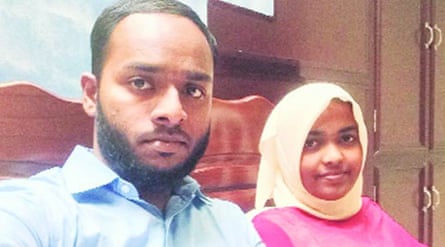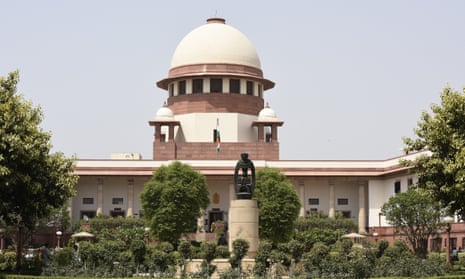The Indian supreme court has delayed its decision on whether judges were right to annul the marriage of a 24-year-old woman in Kerala and force her to live back at her parents’ house because she married a Muslim man. The move has shocked campaigners, as the court has established a reputation for supporting the rights of Indian women.
Akhila Ashokan, who prefers to be known as Hadiya, converted to Islam from Hinduism while studying medicine in Coimbatore in Tamil Nadu. Last year, she met Shafin Jahan, a Muslim, and they married in December. Her livid father went to the Kerala high court demanding that Hadiya be returned to his custody.
In May, the court nullified the wedding and forcibly sent Hadiya back to her parental home in Kottayam despite her express wish not to return. The controversial judgment said Hadiya was “weak and vulnerable, capable of being exploited in many ways” and that “her marriage being the most important decision in her life, can also be taken only with the active involvement of her parents”.
On Wednesday, the supreme court ruled that India’s National Investigation Agency, which investigates terrorism, must assess whether Hadiya converted freely to Islam or was part of a “love jihad” – a phrase used by some Hindu fringe groups to allege that Muslim men are forcing Hindu women into marriage.
Hadiya has had virtually no contact with anyone outside her parents’ home since May. Local reporters say she has no phone or internet access and the house is guarded by police officers. A police officer quoted in the local media said social isolation had made Hadiya depressed.

Jahan approached the supreme court to rule on the validity of the ruling that annulled his marriage. In his petition, he said the high court order was an “insult to the independence of the women of India as it completely takes away their right to think for themselves”.
But instead of overturning the lower court’s ruling, the supreme court ordered a federal investigation into the union.
In a video clip of Hadiya in her parent’s house, shot recently by a social activist, she is heard asking her mother: “Is this how I should live? Is this my life?”
The court has previously been forceful in its support of Indian women’s rights, by ruling against honour killings and other customs that deny women the right to exercise their choice. Rebecca Mammen, a senior lawyer in India, said she was “simply stunned” by the supreme court decision.
“It [the marriage] is clearly a consensual relationship between two adults, totally voluntary – the woman has not complained of any coercion – I don’t know of any law that allows a court to act in this way,” said Mammen. “So all I can say that I am really taken aback.”
Vrinda Grover, a lawyer with a track record of defending women’s rights, called Hadiya’s confinement “illegal house arrest”. Grover said it was typical, when an Indian woman transgressed social norms by exercising her own choice, that society should react by curbing her freedom.
“Her right, as an adult, to choose her husband irrespective of his caste or creed or ethnicity and her right to freedom of religion have been violated,” she said. “The courts are behaving as though she doesn’t know what’s good for her. The fact of being kept confined by her parents has deprived her of her personal liberty.”
- This article was amended on 22 August 2017 to clarify that the supreme court had not upheld the annulment, but had delayed a decision on it pending a federal investigation.
